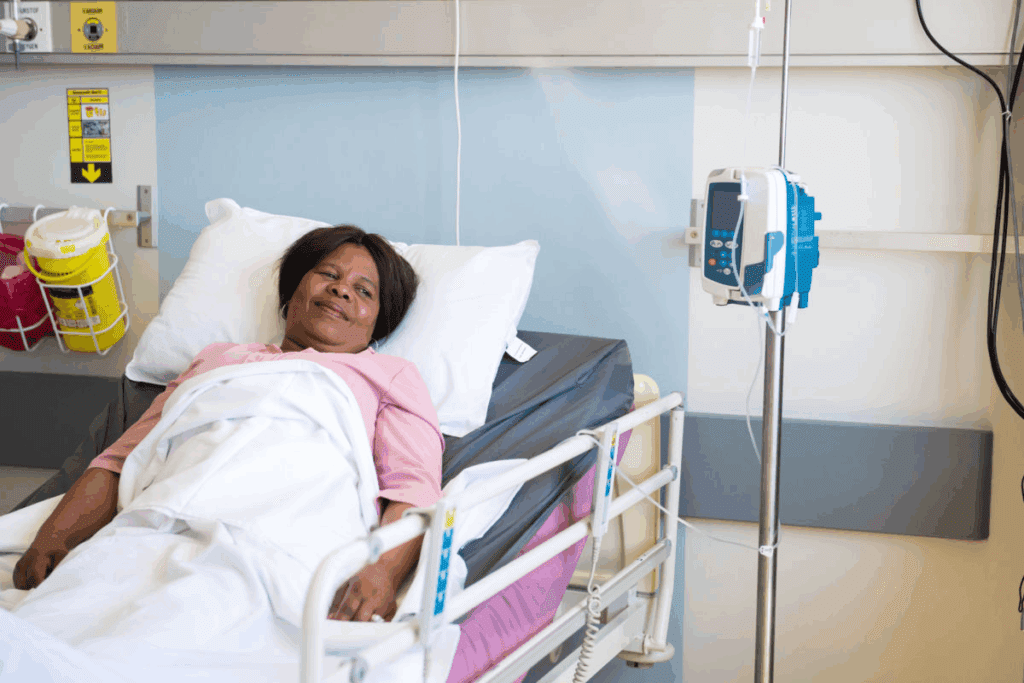
Have you noticed a tender bump at the base of your skull? Swollen lymph nodes in this area are called occipital lymph nodes. They are located just above your hairline. They help filter out infections in your scalp and head region.
These bean-shaped immune structures have white blood cells. They fight off bacteria, viruses, and other harmful pathogens.
At Liv Hospital, we know swollen lymph nodes can be a sign of infection or illness. If they don’t go away or if you have other symptoms, you might need to see a doctor. Our team focuses on you, using top medical skills to find the right treatment for your lymph node issues.
What causes swollen nodes back of head (occipital lymph nodes)? Learn about the common causes like scalp infection and viral illness.
Key Takeaways
- Swollen lymph nodes on the back of the head are known as occipital lymph nodes.
- These nodes serve as filters for infections affecting the scalp and head region.
- Swollen lymph nodes may result from an infection or illness.
- Persistence or additional symptoms may require medical care.
- Liv Hospital provides accurate diagnosis and evidence-based treatment for lymph node concerns.
Understanding Occipital Lymph Nodes

Occipital lymph nodes are at the back of the head. They help filter out bad stuff and boost our immune system. These nodes are key to keeping us safe from infections.
Location and Anatomy
The occipital lymph nodes sit at the skull’s base. This spot lets them watch for and fight off threats in the head and scalp. They are small, round or bean-shaped groups of cells in our lymphatic system.
Inside, they have white blood cells that battle infections. Knowing about these nodes helps us see their role in keeping us healthy.
Function in the Immune System
The main job of the occipital lymph nodes is to clean the lymph fluid as it moves through our body. They find and fight off pathogens like bacteria and viruses in the head and scalp.
This cleaning is key to stopping infections from spreading and starting the right immune response. The occipital lymph nodes work with other lymph nodes and immune cells to protect us fully.
| Function | Description |
| Pathogen Filtering | Filtering out bacteria, viruses, and other pathogens from the lymph fluid. |
| Immune Response | Aiding in the activation of immune cells to fight infections. |
| Cellular Defense | Containing white blood cells that directly combat invaders. |
Understanding how the occipital lymph nodes work helps us see their big role in our health and immunity.
The Role of Nodes Back of Head in Your Immune Defense

The occipital lymph nodes are key to our immune system, focusing on the scalp and head. They are part of a network that fights off infections and diseases.
How Lymph Nodes Filter Pathogens
Lymph nodes, like those at the back of the head, filter out viruses, bacteria, and more. This is vital to stop infections from spreading. When a pathogen gets in, it’s caught by immune cells in the lymph nodes.
The nodes at the back of the head deal with pathogens from the scalp or head. They have immune cells like lymphocytes and macrophages. These cells work together to fight off the invaders.
The process involves:
- Lymphatic fluid carrying pathogens to the lymph nodes
- Immune cells recognizing and attacking the pathogens
- The lymph nodes filtering out the pathogens, preventing further infection
Why Occipital Nodes Protect the Scalp and Head
The occipital lymph nodes are placed to guard the scalp and head from infections. This area is exposed and has hair follicles, making it a path for bacteria and other microorganisms.
By stopping these pathogens, the occipital lymph nodes are essential for scalp and head health. They work with other immune systems to offer full protection against infections.
In summary, the occipital lymph nodes are a critical part of our immune defense system, protecting the scalp and head from various pathogens.
Common Causes of Occipital Lymph Node Swelling
Swollen occipital lymph nodes can come from many sources. These include bacterial and viral infections, as well as fungal ones. Knowing what causes them helps find the right treatment and ease symptoms.
Bacterial Infections
Bacterial infections often cause swollen lymph nodes at the back of the head. Impetigo, a contagious skin infection, is a common culprit. Other infections, like those from Staphylococcus or Streptococcus bacteria, can also swell lymph nodes.
- Impetigo
- Staphylococcal infections
- Streptococcal infections
Viral Infections
Viral infections are another big reason for swollen lymph nodes. Viruses like rubella (German measles) and mononucleosis (mono) can make these nodes swell. These infections often bring fever, rash, and sore throat too.
- Rubella (German measles)
- Mononucleosis (mono)
- Other viral infections
Fungal Infections
Fungal infections can also swell occipital lymph nodes, though they’re less common. Ringworm of the scalp, or tinea capitis, is a fungal infection that can swell lymph nodes. It’s more common in kids and needs antifungal treatment.
- Ringworm (tinea capitis)
- Other fungal infections affecting the scalp
In summary, swollen occipital lymph nodes can stem from many infections. Identifying the cause is key to effective treatment.
Specific Conditions That Affect Occipital Lymph Nodes
Occipital lymph nodes at the back of the head can swell for many reasons. These nodes are key to our immune system. Swelling might show that something is wrong.
Head Lice Infestations
Head lice are common, mainly in kids. They feed on human blood, causing scalp itchiness. This itch can lead to skin problems and infections.
As a result, the occipital lymph nodes swell. They’re fighting off the infection. It’s important to treat head lice to ease discomfort and prevent more issues.
Scalp Injuries and Trauma
Scalp injuries, big or small, can make lymph nodes swell. The body sends more blood to the injured area, causing inflammation. This inflammation makes lymph nodes swell as they try to fight off infections.
Scalp trauma, like cuts, can also bring bacteria into the skin. This increases the chance of infection and swollen lymph nodes. Keeping the scalp clean and watching for signs of infection is key.
Dermatitis and Eczema
Dermatitis and eczema can really bother the scalp, causing itchiness and inflammation. This irritation can make the occipital lymph nodes swell as the body reacts.
Managing these conditions with the right skincare and treatment can help avoid swollen lymph nodes. Seeing a healthcare professional for a proper diagnosis and treatment is a good idea.
| Condition | Symptoms | Effect on Occipital Lymph Nodes |
| Head Lice Infestations | Itching, scalp irritation | Swelling due to infection |
| Scalp Injuries and Trauma | Pain, inflammation | Swelling due to infection or inflammation |
| Dermatitis and Eczema | Itching, skin irritation | Swelling due to inflammation |
Inflammatory Conditions and Occipital Node Swelling
We look into how inflammatory conditions, like autoimmune disorders, cause swelling in the occipital lymph nodes. These conditions can really affect our health. It’s important to know how they impact the lymph nodes behind our head.
Psoriasis and Related Skin Conditions
Psoriasis is a chronic skin issue with itchy, silver patches. It can cause inflammation and swelling in the occipital lymph nodes. Psoriasis is more than a skin problem; it’s an immune system disorder with wide-reaching effects. The inflammation from psoriasis can make the lymph nodes swell.
Other skin issues, like seborrheic dermatitis, can also make the occipital lymph nodes swell. These conditions often spark an immune response that affects the lymph nodes.
Autoimmune Disorders Affecting the Scalp
Autoimmune disorders happen when the body’s immune system attacks its own tissues. Conditions like lupus and rheumatoid arthritis can hit the scalp, causing swelling in the occipital lymph nodes. The link between autoimmune disorders and lymph node swelling is complex and involves a multifaceted immune response.
| Autoimmune Disorder | Effect on Scalp | Impact on Occipital Lymph Nodes |
| Lupus | Skin lesions and inflammation | Swelling due to immune response |
| Rheumatoid Arthritis | Rare scalp involvement, but possible | Potential swelling due to systemic inflammation |
In conclusion, conditions like psoriasis and autoimmune disorders can greatly affect the occipital lymph nodes, causing swelling. It’s key to understand these conditions and their impact on the immune system for proper diagnosis and treatment.
Recognizing Symptoms of Swollen Occipital Lymph Nodes
It’s important to know the signs of swollen lymph nodes at the back of the head. These signs can point to a health issue that needs a doctor’s check-up.
Physical Characteristics
Swollen lymph nodes show up as lumps or bumps at the back of the head. They are usually tender and can hurt. The size of these lumps can vary, from small pea-sized to larger ones.
- Tenderness or pain when touched
- Visible swelling or enlargement
- Soft or firm texture
Associated Symptoms
Swollen occipital lymph nodes might come with other symptoms. These can include:
- Runny nose or nasal congestion
- Sore throat or cough
- Headaches or earaches
- Fever or chills
These symptoms can help figure out what’s causing the swollen lymph nodes.
One-Sided vs. Bilateral Swelling
Swollen lymph nodes can appear on one side (unilateral) or both sides (bilateral) of the head. Unilateral swelling might mean a localized infection or injury. Bilateral swelling could point to a systemic issue or widespread infection.
Knowing if the swelling is one-sided or bilateral is key to finding the cause and treatment. We’ll dive deeper into this in the next sections.
Itchy Scalp and Swollen Lymph Nodes: The Connection
Having an itchy scalp and swollen lymph nodes can be worrying. It’s important to know why these symptoms happen together. We’ll look at common reasons and when they might mean something serious.
Common Causes of Both Symptoms
Many things can cause an itchy scalp and swollen lymph nodes. Head lice infestations are a big one, causing itching and swelling as the body fights off the lice. Scalp psoriasis also leads to these symptoms, with inflammation and irritation on the scalp.
Dermatitis and eczema can make the scalp itch and swell. Fungal infections like ringworm of the scalp can also cause these symptoms.
When This Combination Signals a Serious Problem
While many causes are minor, sometimes these symptoms mean something serious. For example, persistent swelling could be a sign of lymphoma or other cancers. If you have these symptoms and also feel feverish, lose weight, or have night sweats, see a doctor right away.
It’s key to understand why an itchy scalp and swollen lymph nodes happen together. If you’re dealing with these symptoms, see a healthcare professional. They can help figure out what’s going on and treat it.
Diagnosing Issues with Occipital Lymph Nodes
Healthcare professionals use several methods to find out why lymph nodes on the back of the head swell. They look at physical signs, medical history, and sometimes run tests.
Physical Examination Techniques
First, a detailed physical check is done. We look at the size, tenderness, and feel of the lymph nodes. We also note symptoms like fever, weight loss, or night sweats.
During the check, we look for signs of infection or inflammation in the scalp. This includes redness, warmth, or tenderness. It helps us find the cause of the swelling.
Medical Tests and Imaging
If the cause is not clear, we run medical tests. Blood tests can show infections or inflammation. For example, a complete blood count (CBC) can show signs of infection.
Imaging tests like ultrasound, CT scans, or MRI scans are used too. They help us see the lymph nodes and tissues around them. These tests can find things like abscesses, tumors, or other growths.
| Test | Purpose | Potential Findings |
| Complete Blood Count (CBC) | To check for signs of infection or inflammation | Elevated white blood cell count indicating infection |
| Ultrasound | To assess lymph node size and characteristics | Enlarged lymph nodes, abscesses, or tumors |
| CT Scan | To evaluate lymph nodes and surrounding tissues | Detailed images of lymph node abnormalities |
Biopsy Procedures
In some cases, a biopsy is needed. This involves taking a tissue sample from the lymph node for a microscope check.
Studies show that about 35.6 percent of tuberculosis cases affect the cervical lymph nodes. This shows how important accurate diagnosis through biopsy and other tests is.
By using physical checks, medical tests, and biopsies, we can find the cause of swollen lymph nodes. Then, we can plan the best treatment.
Treatment Options for Swollen Nodes on Back of Head
Dealing with swollen nodes on the back of the head needs a mix of self-care, medical help, and finding the cause. The right steps depend on why the nodes are swollen. It could be from infections or inflammatory conditions.
Home Remedies and Self-Care
For mild cases, home remedies and self-care can work well. Applying warm compresses to the area can lessen swelling and pain. Keeping the scalp clean and avoiding scratching helps prevent more irritation or infection.
Getting enough rest, drinking plenty of water, and eating a balanced diet helps the immune system. Over-the-counter pain relievers can also help with pain or discomfort.
Medical Treatments
If the swelling is from a bacterial or fungal infection, antibiotics or antifungal medications might be needed. For viral infections, treatments aim to ease symptoms while the body fights the virus. If it’s an inflammatory condition, anti-inflammatory medications or corticosteroids could be suggested.
Seeing a healthcare professional for a proper diagnosis and treatment plan is key. They can check the swelling’s severity and suggest the best course of action.
Addressing the Underlying Cause
It’s important to treat the cause of swollen occipital lymph nodes. Whether it’s an infection, inflammation, or another issue, targeting the root cause helps solve the problem and prevent it from coming back.
For example, treating head lice with medicated shampoos is essential. Managing skin conditions like dermatitis or eczema through topical treatments and lifestyle changes can also help.
Understanding the cause and using the right treatment helps manage swollen lymph nodes on the back of the head. This supports overall health.
When to Be Concerned About Occipital Lymph Node Swelling
Swollen lymph nodes can be scary, but knowing when to worry is key. Occipital lymph node swelling can happen for many reasons. It might be due to infections or more serious issues.
Warning Signs That Require Medical Attention
See a doctor if you notice these signs with swollen occipital lymph nodes:
- Persistence or enlargement of the swollen lymph node over time
- Hard or fixed lymph nodes that do not move when touched
- Fever, night sweats, or weight loss accompanying the swollen lymph node
- Pain or tenderness in the lymph node area
- Redness or warmth around the lymph node
If you see any of these signs, get a doctor’s check-up right away.
| Symptom | Possible Indication |
| Hard or fixed lymph nodes | Potential sign of a serious underlying condition, including cancer |
| Fever, night sweats, or weight loss | May indicate an infection or systemic illness |
| Pain or tenderness | Could be a sign of inflammation or infection |
Understanding Occipital Lymph Node Cancer Risk
Occipital lymph node cancer is rare, but knowing the risks is important. Cancerous lymph nodes are hard, painless, and stuck to the tissue around them. If you see unusual swelling or changes, get a doctor’s opinion.
It’s vital to watch your health and seek help if symptoms worry you. Catching problems early is key to treating them well.
Preventing Problems with Occipital Lymph Nodes
To prevent issues with occipital lymph nodes, we need to focus on scalp hygiene and overall health. Keeping our scalp clean and adopting healthy habits can greatly lower the chance of swollen lymph nodes at the back of the head.
Scalp Hygiene Practices
Good scalp hygiene is key to avoiding infections and conditions that cause swollen occipital lymph nodes. Washing your scalp regularly with a gentle shampoo removes dirt, oil, and other substances that can clog pores and cause infections.
- Use a mild shampoo suitable for your scalp type.
- Avoid sharing personal care items like combs and hairbrushes.
- Keep your scalp moisturized, if you have dry skin conditions.
Also, be careful with hair care products. Avoid those with harsh chemicals to prevent scalp irritation.
Preventative Health Measures
Good health practices are also important for healthy lymph nodes. Eating a balanced diet full of fruits, vegetables, and whole grains boosts our immune system.
| Health Practice | Benefit |
| Balanced Diet | Supports immune function and overall health |
| Regular Exercise | Enhances immune response and reduces stress |
| Adequate Sleep | Helps in the repair and regeneration of immune cells |
Regular visits to healthcare providers can also help catch and treat any issues early on.
By combining scalp hygiene with these health practices, we can effectively lower the risk of problems with occipital lymph nodes. It’s about taking a holistic approach to health. This includes specific care for the scalp and overall wellness.
Conclusion
Swollen lymph nodes on the back of the head can be worrying. But knowing what causes them and how to manage them is key. We’ve looked at how these nodes work in our immune system, why they swell, and what treatments are out there.
It’s important to know the signs and when to see a doctor. We’ve talked about how infections, diseases, and injuries can cause these nodes to swell. Treating the root cause is the first step to getting better and avoiding bigger problems.
In short, swollen lymph nodes need attention and the right diagnosis. Knowing about causes, symptoms, and treatments helps people stay healthy. This summary shows why it’s critical to understand swollen lymph nodes to get the right care on time.
FAQ
Where are the occipital lymph nodes located?
The occipital lymph nodes are found at the skull’s base, in the head’s back. They help fight infections in the scalp and head by filtering pathogens.
What causes swollen occipital lymph nodes?
Swollen occipital lymph nodes can result from infections, like bacterial, viral, or fungal ones. Inflammatory conditions, such as psoriasis, and autoimmune disorders also cause swelling. Head lice, scalp injuries, and skin issues like dermatitis and eczema can also lead to swelling.
What are the symptoms of swollen occipital lymph nodes?
Symptoms include visible swelling or lumps at the skull’s base, tenderness, and sometimes pain. You might also feel fever or itchiness on the scalp. Swelling can be on one side or both.
How are swollen occipital lymph nodes diagnosed?
Doctors use physical exams, medical tests, and sometimes biopsies to diagnose swollen occipital lymph nodes. This helps find the cause of the swelling.
What are the treatment options for swollen occipital lymph nodes?
Treatments include home remedies, medical treatments for the cause, and addressing related health issues. Knowing the cause is key to effective treatment.
When should I be concerned about occipital lymph node swelling?
Be concerned if swelling persists, is with other symptoms, or if you have cancer or autoimmune disorders. Knowing when to seek medical help is important.
Can an itchy scalp cause swollen occipital lymph nodes?
An itchy scalp can lead to swollen occipital lymph nodes, often due to conditions like dermatitis or eczema. Understanding this connection helps in diagnosis and treatment.
How can I prevent problems with occipital lymph nodes?
Prevent issues by keeping your scalp clean, managing skin conditions, and taking health measures to avoid infections.
Are there lymph nodes on the head?
Yes, there are lymph nodes on the head, including the occipital ones at the back. These nodes are vital for fighting infections.
What does it mean if I have swollen glands in the back of my head?
Swollen glands in the back of the head mean your body is fighting an infection or illness. Finding the cause is key to proper treatment.
Reference
National Health Service (NHS). (2025). What Are Swollen Lymph Nodes on Back of. Retrieved from https://www.nhs.uk/conditions/swollen-lymph-nodes/








